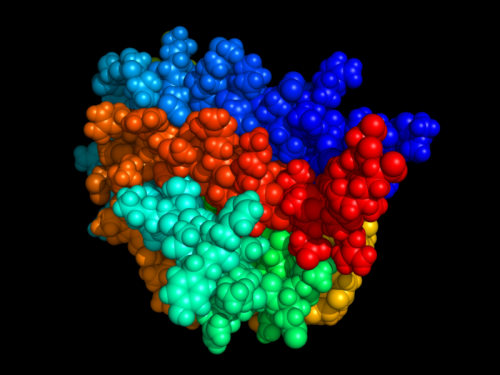December 13, 2013 report
Researchers synthesize erythropoietin ushering in new era of biotech drugs

(Phys.org) —A team of researchers working at the Sloan Kettering Institute for Cancer Research has succeeded in building a glycoprotein from scratch. It marks an enormous step forward, the team reports in their paper published in the journal Science, in the creation of biotech drugs without the need for living cells.
Modern drugs tend to fall into two main categories, those that are made of small molecules and come about due to chemical reactions, and those that are created using living cells. The first category is well understood and constitutes the majority of drugs on the market. The second category is more complicated as it generally involves mimicking proteins that are normally found naturally in the body. The drug erythropoietin (EPO) is one such example—it's made by starting with hamster ovary cells and its purpose is to stimulate the production of red blood cells. It's also a drug that has become well known as it was used by cyclists to cheat when riding in the Tour de France. Normally, it's used to treat anemia. In this new effort, the researchers developed a way to create EPO without using any living cells. In other words it was synthesized from scratch.
More properly, the team created one version of EPO—in nature, it exists in many forms and in humans is created naturally by the kidneys. To create it in their lab, the team used four synthetic methodology entries that allowed for building the chain that makes up the protein—which includes incorporating large sugars. The result is a drug that when tested in the lab was found to induce the creation of red blood cells in mice.
Synthesizing a glycoprotein rather than growing it has one main advantage, it allows for the creation of an exact product—when EPO is grown, for example, many different variants result because of its biological nature, which means that each dose is slightly different from most others. Synthesizing it, however, guarantees a single variant every time it's made. Perhaps more importantly, it also allows for the development of several individual variants depending on need.
The process used by the team in this new effort still needs to undergo additional testing, of course, there are questions, for example regarding whether the resultant molecule is folded correctly. But it does suggest that in the future pharmaceutical companies won't have to rely on the vagaries of living cells for the manufacture of protein based therapies.
More information: Erythropoietin Derived by Chemical Synthesis, Science 13 December 2013: Vol. 342 no. 6164 pp. 1357-1360. DOI: 10.1126/science.1245095
Abstract
Erythropoietin is a signaling glycoprotein that controls the fundamental process of erythropoiesis, orchestrating the production and maintenance of red blood cells. As administrated clinically, erythropoietin has a polypeptide backbone with complex dishomogeneity in its carbohydrate domains. Here we describe the total synthesis of homogeneous erythropoietin with consensus carbohydrate domains incorporated at all of the native glycosylation sites. The oligosaccharide sectors were built by total synthesis and attached stereospecifically to peptidyl fragments of the wild-type primary sequence, themselves obtained by solid-phase peptide synthesis. The glycopeptidyl constructs were joined by chemical ligation, followed by metal-free dethiylation, and subsequently folded. This homogeneous erythropoietin glycosylated at the three wild-type aspartates with N-linked high-mannose sialic acid–containing oligosaccharides and O-linked glycophorin exhibits Procrit-level in vivo activity in mice.
Journal information: Science
© 2013 Phys.org


















